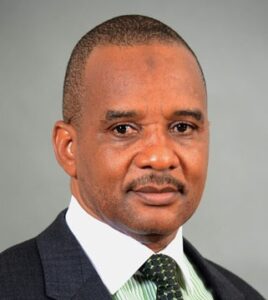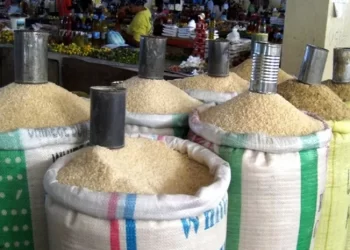
By Dr Bashir Jamoh
Nigeria Maritime: A Conceptual Clarification
853km Coastline, 200nm of Exctusive Economic Zone, 12nm of Territorial Waters. 10,000km
Inland Waterways (Over 3,000 navigable), 6 Major Port Complexes spread in 8 Coastal States, Nigeria averages 5000 vessel calls a year, attracting over 70% of the total cargo traffic to West and Central Africa sub-Region. Hence, Shipping is the driver of Nigeria’s import/export economy.
It is also the driver of Nigeria’s oil and gas Industry. Nigeria’s over 200 Million population which underpins her capacity for consumption (Market) is another driver for Nigeria’s import-export shipping trade.
Therefore. Nigeria’s Economic Growth Trajectory must be predicated on the optimization of the opportunities inherent in the industry through a robust Maritime Governance architecture in the areas of ships/ boats building, fleet ownership and expansion, indigenous cargo affreightment, offshore & floating facilities spare parts and maintenance. freshwater bunkering & supply, Bunker Oils supply, aquaculture, fauna and flora. channel dredging, inland waterways transportation among others
Sustainable Maritime Opportunities in the Gulf Of Guinea
Nigeria occupies strategic location in international seaborne trade along the Gulf of Guinea.
The Gulf of Guinea is home to two Regional Economic Blocks: Economic Community of Central African States (ECCAS) and Economic Community of West African States (ECOWAS) comprising 26 countries. The region holds a significant percentage of the world’s total oil and gas reserves as well as rich deposits of natural resources such as Diamonds. Bitumen. Copper, Uranium, Granit, Quartz, Lead, Fluorite, Marble, etc.
It is therefore seen as a resource provider and critical contributor to national growth and Prosperity of the nation’s lining its coasts and even those inward and with no shared boundaries due to the access it grants to them. More importantly, the region’s waterways serve as key navigational routes for international commerce, connecting the Far East to countries in the North and South of the Atlantic. It is the hub of extensive trans-Atlantic trade linking Africa with Europe and the Americas. Hence. we cannot divorce maritime safety and security in Nigeria from the Gulf of Guinea.
Despite the potentials of the Maritime sector in the areas of job creation, revenue generation, and its vital role in facilitating more than 90% of world trade through shipping, the sector is undermined by maritime insecurity. Piracy data is often used as an indicator of general maritime security in the Gulf of Guinea. Changing piracy trends could be the result of different levels of maritime awareness and capability among countries, which in turn affects the reporting of incidents.
Studies have identified the following factors as the drivers of maritime insecurity in the Gulf of Guinea. They include:
·An increase in ship traffic as a result of globalization;
·The debilitating leadership of many of the 23 states in that region;
·The proliferation of small arms;
·The poor monitoring and control of the oceans;
·Corruption, poverty, unemployment and criminality.
·Other factors are legal and jurisdictional weaknesses, location, conflict and disorder situations,
·Underfunded law enforcement or inadequate security,
·Permissive political environments, Cultural acceptability/maritime tradition, and the promise of reward.
·‘Evidence with the COVID-19 pandemic has also shown spikes in maritime insecurity associated with the global economic downturn that was brought about by the pandemic.
Issues necessitating the “Greater Stakeholder Collaboration –: in tackling maritime Insecurity
The need for increased collaboration to tackle maritime insecurity can be explained from a political-economy, and international stand point.
Political-Economy Issues
·The increasing cost of maritime insecurity and piracy have continued to increase to deplete the human resources and revenue to the sector.
·The rising cost of maritime insecurity to the economy 1s another issue that calls for increased collaboration of all stakeholders to tackle mant me insecurity
·For instance, the UNODC reported that its global maritime program which began in 2009 with about $2000 dollars to address Somali Pirates have increased to over $200 million prod ng capacity building and support for legal reforms. maritime training campus and more
The vast nature of the nation’s wet and dry ports is another factor that calls for efficient collaboration amongst stakeholders to address maritime insecurity Working insolation, will only overstretch human resources and or increase the wear and tear of technological resources.
The Gulf of Guinea off West Africa is in fact considered the most dangerous route for commercial shipping accounting for the majority of maritime kidnappings worldwide lead ng to war risk insurance premium
The chances of Nigeria to effectively benefit from the African Continental Free Trade Area (AfCFTA) would also be hampered if maritime insecurity is not tackled using a systematic approach. Ships from the world over bring goods to Nigeria, but go back empty. This is in itself a source of insecurity as it signals weak export base, poor level of economic diversification, and worsening unemployment situation.
Maritime piracy attacks have a high frequency of occurrence on Nigeria’s Exclusive Economic Zone (EEZ) and territorial waters.
The economic cost of maritime Insecurity is very pronounced for Nigeria compared to other countries. While the economic cost of piracy activity in Asia was estimated at about $1.4 billion (as of May 2018), the estimated economic cost of maritime insecurity in West Africa was about $818.1 billion. Contracted maritime security and privately armed security at $292.5m. The sources through which piracy leads to loss of revenue in the maritime and waterways sector were identified as:
·Ransom
·Insurance Premium
·Re-Routing Ships
·Security Equipment
·Losses to Oil and Fishing industry
·Cost of Security Escort
The nation’s capacity to explore other economic opportunities that the maritime sector offers is also hampered due to maritime insecurity. These other resources include ICT infrastructure development for the maritime sector, fishing, and maritime tourism, amongst others.
Addressing maritime insecurity will therefore be better conceptualized using a holistic framework.
Insecurity and Conflict Issues
There was also the defeat of ISIS in Iraq and Syria; all these coupled with the spread of Al Qaeda ideology in North Africa, and parts of the Sahel since the 1990’s have tended to impact significantly on the national security of Nigeria.
Relevant Information
·Value of stolen ships, crew and cargo estimated at $6.3m
·Rerouting of ships: slowly moving ships are at a great risk of piracy attacks estimated at $2 to $3billion
·Losses to the oil and fishing industry in Nigeria estimated at $42m
·War risk in GoG is estimated at $18.5m
·Kidnap for Ransom estimated at $20.7m. Kidnap for ransom insurance as additional protection for ships’ crew
·Ghana, Togo, Benin and Nigeria established “Secure Zones” at a cost of $9.3m
·Cos of information sharing and coordination centres -$29m
·Ship Protection Measures (SPM) for 2017 at $6.8.
·Cost of prosecution and imprisonment related to act of piracy and armed robbery in East Africa and 4 regions is put at $6.24m
·Risk area Premium Western Indian Ocean $41 6m
*SOURCE: Oceans Beyond Piracy{OBP) Report, 2017.
Lessons and Recommendations From Other Countries.
Mexico provides an example in the context of addressing maritime insecurity. For example, to promote Maritime security, Mexico has undertaken a number of actions that support work in various areas, such as maintaining the rule of law and safeguarding human life on the seas. Other lessons to learn are: *ensure the rule of law and to prevent the occurrence of illicit, acts on our coast; and
Evidence from other climes also shows that stakeholder collaboration is also used to tackle Maritime Insecurity. In South Korea and Indonesia for instance, maritime insecurity is aggravated as a result of Jurisdictional issues that arise due to overlapping maritime boundaries. Other challenges such as Climate change, and its consequences of rising sea level, are other issues that fuel maritime sector insecurity.
These challenges are tackled using Inter-agency cooperation to support enforcement against illegal activities. The Royal Thai Navy offers assistance to the ASEAN maritime cooperation. Other forms of cooperation are through Regional Cooperation Agreement on Combating Piracy and Armed Robbery against Ships in Asia (ReCAAP); Promotion of integrated coastal management (ICM) approach, and in other countries like New Zealand, the initiation of National Ocean Policy.
Efforts by NIMASA in Stakeholder Collaboration
As NIMASA, there has been several efforts to improve collaboration with stakeholders to tackle maritime insecurity. One of which is the deep blue project. The deep blue project 1s another aspect of collaboration that NIMASA have put, facilitated amongst the security agencies to tackle maritime insecurity.
The C41 centre, which represents the operational headquarters of the project represents the all-embracing strategy for the participation of the agencies in the deep blue project where the Nigerian Army, Nigerian Navy and the Air force collaborated to achieve the desired objective of the project without any issues either in terms of operation or relationships.
Ensuring effective implementation of existing legislation such as the SPOMO (Suppression of Piracy and Other Maritime Offences) Act, is another aspect that requires effective collaboration. It is also important to ensure that the resolutions by the Security Council are domesticated and implemented. This will include implementing the global counter terrorism instruments, the international drug control conventions and the convention against corruption of the UNODC for member states.
There are a number of collaborative effort that NIMASA under President Muhammadu Buhari’s administration have initiated from 2017 to date.
They include:
· The Suppression of Piracy and Other Maritime Offences (SPOMO) Act, 2019.
· The Deep Blue Project,
· Imperatives of Community Engagement in Combating Piracy in Nigeria’s Maritime Domain Criminality commences from a community.
· Strengthening of the Navies of the GoG Region;
· Increased Teamwork and Collaboration between NIMASA and other stakeholders such as CEOs of Maritime Industry Organizations, Joint Maritime Industry Working Group UMIW/G),
· Proactive and collaborative visits/engagements with critical maritime agencies in Nigeria including but not limited to the Nigerian Navy. the Nigerian Airforce, the Nigerian Police Force. the Nigeria Customs Service, the Nigerian Immigration Service, and
· the Gulf of Guinea Maritime Collaboration Forum
In 2019. President Muhammadu Buhari signed the Suppression of Piracy and Other Maritime Offences (SPOMO) Act into law in 2019. Section 1 of the Act provides that the objective of the legislation is to prevent and suppress piracy. armed robbery and any other unlawful act against a ship, aircraft and any other maritime craft. This Act provided the legal framework for addressing maritime insecurity. Within such a short period from its passage and enactment, the SPOMO Act proved invaluable in the successful prosecution and conviction of 17 persons arrested form piracy and sea criminalities.
To give further strength to the collaborative value embedded in the Act, NIMASA has established the Annual Admiralty Colloquium for the regular training of Judges in maritime-related matters for effective jurisprudence. The first edition held in April 2021 in Lagos attracting the attendance in person of Hon Justice Monica Dongban-Mensem, the President of the Court of Appeal.
Imperatives of Community Engagement in Combating Piracy in Nigeria’s Maritime Domain. Criminality commences from a community. NIMASA through its carrot and stick strategy has deployed a strategy of engagement with the coastal communities through its littoral states outreach programme. Having engaged with six governors mainly of littoral states – from Bayelsa to Delta to Rivers to Ondo to Lagos, our joint working sessions involving NIMASA and select teams from the states have begun addressing challenges peculiar to specific coastal communities. NIMASA’s Science and Technical College at Okoloba in Delta state is currendy undergoing redesign to be launched as the NIMASA Centre for Entrepreneurship (NICE) to train youths from various Niger-Delta communities on boat and small craft building ship recycling business, marine litter marshals and the award of scholarships to over 2 500 youths through the NIMASA National Seafarers Development Programme (NSDP) amongst several initiatives simultaneously being implemented.
Furthermore, the synergy and strengthening of the Navies of the GoG Region as well as the establishment of regional frameworks for collaboration are proving to be sure ways to drastically mitigate diverse maritime crimes in the Region. The successful formation in April 2021 of and plenary meeting in July 2021 of the Shared Awareness and De-Confliction Gulf of Guinea Forum aka SHADEGOG Forum to galvanize information sharing and navies working with industry within the Gulf of Guinea has strengthened regional capacity to fight piracy.
Increased Teamwork and Collaboration NIMASA has been instrumental in increased collaboration and information sharing between critical maritime Stakeholders such as CEOs of Maritime Industry Organizations, Joint Maritime Industry Working Group (JMIWG). etc to ensure that the busy shipping routes through the GoG operate securely.
As a proof of the need to foster greater collaboration amongst stakeholders in tackling maritime insecurity. the ICC Yaounde and Nigeria have agreed to use the GOG-MCF/SHADE to engage in awareness and activities that would help reduce criminality in the Gulf of Guinea The initiative is open to all the countries in the region that show the willingness and have the capacity to be part of the collaboration, on a voluntary basis.
Recommendations
There is need to conserve our blue economy (maritime environment and marine resources) This would include promoting sustainable fishing:
Pay rapt attention to fiscal sustainability and absorption capability of Maritime agencies:
Ensuring that Maritime disputes are resolved peacefully and in accordance with international law. Also, ensuring that taking care of the needs and respecting the rights of maritime workers such as the right of the seafarers;
Also, there is the need to strengthen dialogue and exchange on all issue concerning maritime issues. This will involve deepening pragmatic cooperation and working with all stakeholders to strengthen response to security threat in the maritime sector and the nation at large.
There is need for the deployment of more resources for technical assistance for capacity building and expansion of automation systems for monitoring the maritime sector. This will enhance the nation’s capacity for cooperation against trans-national maritime crime and terrorism.
There is also need to enact domestic legislation as well as enable cross border law enforcement and criminal justice cooperation to share intelligence and investigate and prosecute crimes at sea.
Continuous strengthening of international and regional cooperation as well as public private partnerships to counter maritime crimes, thereby enhancing criminal justice capacities.
Leverage technology in the fight against maritime crime including through the provisions of satellite imagery, radar systems and maritime domain awareness infrastructure:
Tackle the root causes of maritime insecurity and support all countries to achiove the Sustainable Development Goals as part of integrated crime prevention responses most of all for affected coastal communities. Promote Capacity building and information sharing:
Raise awareness and educate people especially youths while providing alternate livelihoods and support for local businesses:
Combat threats to maritime security while building local capacities and empowering local communities to manage the problem sustainably over the long period.
By working together, we can keep our seas safe and free from crime.
Collaboration As A Critical Imperative
There are 5 Categorization of agencies within Nigeria’s Maritime Cluster which include:
1.Armed Forces / National Security Group (Army, Navy, Air Force, etc.)
2.Non-Military Services Group (Customs, Police, Immigrations, NDLEA, etc.)
3.Agencies with Incidental Functions Group (NAFDAC, NNPC, DPR, etc.)
4.Regulatory Agencies Group (NIMASA, NESREA, NOSDRA, NIWA)
5.Disaster Management Agencies (NEMA)
Read Also: Total Nigeria Plc Changes Name To Totalenergies Marketing Nigeria Plc — Official
. Conclusion
The effort to keep the maritime environment in the Gulf of Guinea where Nigeria is a major player safe and secure requires relentlessness on the part of all stakeholders. especially, the countries that make up the region. Collaboration amongst stakeholders within the maritime sector space in Nigeria is also important in order to address issues of conflicting policy stance and unhealthy rivalry.
This collaboration should aim at addressing the factors that drive maritime insecurity and also address the current trend of maritime insecurity in the country This will include unemployment, social exclusion. high cost of living, poverty, and inequality, amongst others. All stakeholders (state and non-state actors) have a role to play in this and NIMASA will remain open to working with all towards addressing maritime insecurity in Nigeria
Perhaps. one of the most important premise for fostering cooperation of stakeholders towards addressing maritime insecurity, is that no country alone can maintain maritime security without bilateral. regional and international efforts This is because maritime security expands geographically with interconnection with different sectors and domains in addition to the different legal and jurisdictional domains
Nigeria. like other countries, must adopt a participatory approach to maritime security. Non-governmental organizations also play an important role in maritime security This is especially through ensuring accountable and transparency governance and management of maritime ports and other entities
Working together. is therefore a most vital approach to defend our seas, enhance maritime security, promote trade. protect the environment. and guarantee the quality of life of our people.
*Dr Bashir Jamoh, DG of NIMASA Presented this paper at the recent Chief of Naval Staff Conference which held in Kano
Kindly like us on Facebook
















Discussion about this post